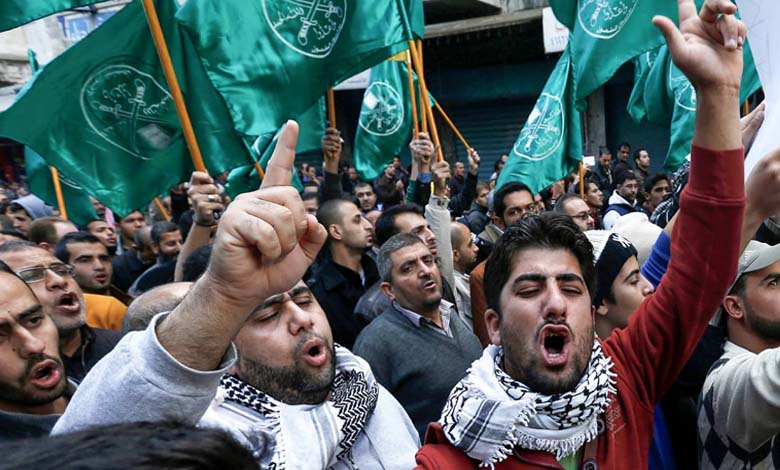Gaza Agreement Exposes the Muslim Brotherhood: Egypt as a Scapegoat to Divert from Internal Rift

Although Egypt’s role in stemming the bloodshed in Gaza has earned unprecedented international praise, the Muslim Brotherhood has insisted on a posture of denial, reverting to its old tactic of turning legitimate causes into platforms for settling scores with the Egyptian state.
-
What is the Relationship between the Founding of the Muslim Brotherhood in Egypt, Iraq, Syria, and the Greater Israel Project?
-
Health of Ghannouchi deteriorates after his arrest… New Islamist game, similar to the Brotherhood in Egypt
While Cairo convened rival parties and met international pressure with steadiness, the Brotherhood used the Palestinian tragedy in propaganda campaigns aimed at undermining Egypt’s standing and regional role, as if achieving peace were a crime in their political lexicon.
With every Egyptian effort to end the war in Gaza or to consolidate a truce, the Brotherhood recycles its distorted narrative: portraying Egypt as a party to the conflict rather than as a pillar of stability.
Thus, their “defense of Palestine” in discourse becomes an instrument of attack against Cairo, and their actions — more than their rhetoric — show that their real struggle is not with Israel but with the Egyptian state itself.
Why do the Brotherhood insist on attacking Egypt?
-
“Year of Lies and Blood”: Major Terrorist Crimes Committed by the Muslim Brotherhood in Egypt
-
A new slap to the Brotherhood in Egypt; The failure of calls November 11 marks the end of the terrorist organization
Munir Adib, a researcher on extremist movements and terrorism, said that the Brotherhood’s sustained attempts to discredit the Egyptian political system have not ceased for thirteen years, but they have become clearer over the past two years as they exploited the Gaza war and the Palestinian cause, which resonates strongly with Egyptians.
Adib explained that the Brotherhood’s insistence on tarnishing Egypt despite the country’s significant roles over the past two years has a purpose: the organization is exploiting the Palestinian issue to advance its own interests, ultimately seeking to topple the Egyptian political system and its institutions.
-
The Muslim Brotherhood Has Betrayed the Egyptian Army Since the 1948 War… A Journalist Presents the Evidence
-
Gaza Agreement Exposes the Muslim Brotherhood: Egypt as a Scapegoat to Divert from Internal Rift
He noted that the Brotherhood’s efforts to frame the Egyptian regime as complicit in the Palestinians’ hardship are merely an attempt to smear the state and turn Egyptians away from it, believing they will gain politically from doing so.
While Khalil al-Hayya, a Hamas leader, publicly thanked all parties — notably Egypt — the Brotherhood ignores such acknowledgements and instead pursues its campaign to discredit Egypt, the researcher added.
-
The Egyptian Contradiction and Sudan’s Stability Crisis: When Ambiguity Opens the Door for the Muslim Brotherhood
-
A Cross-Border Criminal Record: The Story of the Muslim Brotherhood Member Accused of Terrorism in Egypt and Jailed for Rape in London
Amr Abdel-Moneim, a scholar of political Islam, argues that part of the conflict’s purpose is to draw the Brotherhood into the Palestinian crisis; in other words, “no matter what Egypt has done or endured over the past two years, the movement will overlook those efforts.”
On why the Brotherhood persists, Abdel-Moneim adds that the movement is attempting to settle scores with the Egyptian state after its catastrophic failure while in power. He points out that Brotherhood media outlets daily amplify the crisis, framing it as if Egypt — not Israel — had shut the door.
-
Egypt and the Muslim Brotherhood: Talha’s Release Exposes Double Standards and Threatens Regional Security
-
Contradictions in the Egyptian Discourse: Between Declared Hostility Toward the Muslim Brotherhood and Implicit Cover for Affiliated Factions
Why the divergence in Brotherhood statements?
Regarding the discrepancy between the London group’s statement — which lauded Egypt and its role — and the more critical statement from the Front for Change, Abdel-Moneim attributes this to the Brotherhood’s policy of role distribution.
The London branch has reportedly tried for some time to court the Egyptian regime, professing respect for Egyptian sovereignty and position while backing Hamas; yet the organization’s disarray sometimes drives this branch to issue veiled barbs, the researcher says.
-
Egypt’s Muslim Brotherhood and the Prisons: Rumors Without Keys and Lies That Won’t Overturn Sentences
-
Inside the Formation of Egypt’s Muslim Brotherhood Terror Cells: Revelations in a Podcast
Another segment of the Front for Change insists that the conflict be resolved through “armed action and specialized cells,” arguing that confronting Arab regimes should take precedence over confronting Israel.
Adib noted that the Front for Change established armed militias, including “Sawad Misr,” the Brotherhood’s military wing — a group long associated with advocating violence — which explains their continued hostility toward the Egyptian state.
Adib concluded that the Brotherhood is like a “malignant tumor” that must be removed, as it poses a major threat not only to Egypt’s national security but to the entire Arab region.












